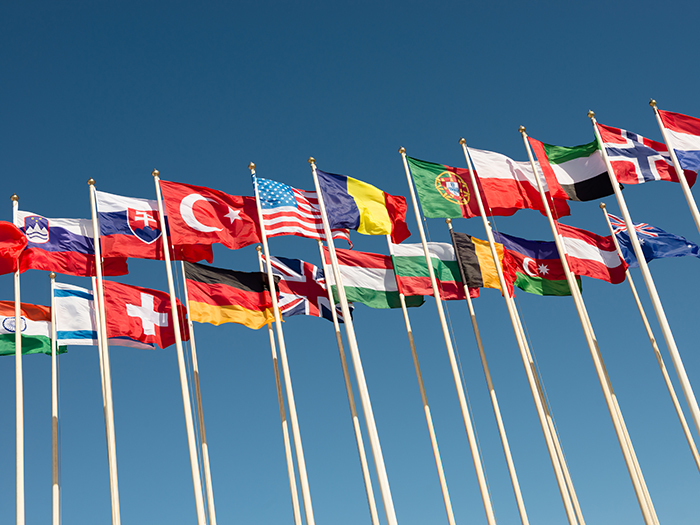Sponsored Content: Allied World
How Current Political Tension Can Impede Business for U.S. Companies — And What Businesses Can Do to Manage the Risk

Trade disputes, military confrontations, economic instability, divisive elections — political risk is not new by any means. However, for businesses operating across the globe today, political uncertainty is making the management of global operations increasingly complex.
“I have never seen a global political risk environment as tense and uncertain as it is today,” said Francisco Cuevas, head of the Political Risk Division at Allied World in North America. Cuevas has worked in political risk and trade credit for more than 20 years, with the last three years at Allied World.
“There are countries, such as Turkey and Mexico, where the U.S. had very good relations, but shifting interests and unexpected circumstances have made those relations strained and uncertain,” he said.
Current political tensions are causing a vast amount of uncertainty for businesses in the U.S. For companies with foreign operations, this uncertainty is proving extra challenging.
“U.S. industrial companies need to forecast their overseas production goals, capital investment needs and revenue targets for coming years, but are unable to predict the impact of increasing political uncertainty on their plans. Similarly, engineering firms, contractors and other project developers face an increasingly unpredictable risk of contract cancellation or unexpected default by foreign government entities,” said Cuevas.
He said that companies with foreign operations need to ask themselves, “If our operations are affected by a disruptive political event, how are our investments in overseas operations protected? Can a change in regime result in the cancellation of our contracts with a foreign government?”
What if a foreign government becomes hostile towards U.S. businesses and demands them to leave or decides to take them over? Is it possible for local citizens to turn violent towards U.S. companies and cause damage to their operations? Can a local currency become inconvertible and prevent the repatriation of dividends and other scheduled payments?

Francisco Cuevas, Head of the Political Risk Division at Allied World in North America
“In order for companies to invest confidently in projects and operations, they have to find ways to mitigate the potential impact of arbitrary actions taken by foreign governments on their operations while protecting hard assets from the threat of damage caused by politically motivated groups of people,” said Mr. Cuevas.
While most U.S. multinational companies possess the sophistication and expertise to adapt in a shifting global geopolitical environment, it is the hidden and often flammable dynamics of foreign politics that can cause crippling damage to otherwise stable manufacturing operations and ongoing projects.
For instance, Mexico is one of the largest trading partners of the U.S. with over $260 billion of goods and services being mutually traded annually. The relationship between Mexico and the U.S. became essential to both countries following the signing of the North America Free Trade Agreement in 1994. Since the signing of the agreement, trade between the countries has tripled and direct U.S. investment into Mexico has grown from $17 billion in 1994 to over $100 billion a year.
Notwithstanding the growth in economic activity, relations between the U.S. and Mexico have been strained by immigration disagreements, renegotiation of NAFTA and the first regime change in Mexico in the last 70 years. The implications for U.S. business are remarkable, with a new regime that embraces populists and antibusiness views along with an uncertain financial future, given that PEMEX, the state owned oil company and largest source of income for the government, is financially strained and unable to increase crude production.
The inpact on U.S. businesses is already clear: “The new president of Mexico canceled the biggest construction project that had been in the works,” said Cuevas.
The promised $13 billion Mexico City airport was scrapped after President Andres Manual Lopez Obrador came into office last December. Data shows that about one-third of the project had already been completed before work was cancelled.
The decision came after a small portion — around 2% — of Mexico’s eligible voters rejected the airport.
“We just don’t know what further actions the Obrador government might take,” said Cuevas. “That uncertainty leaves U.S. businesses vulnerable to arbitrary actions by the new government and searching for solutions.
“U.S. companies performing contracts for the government of Mexico would be wise to obtain protection for their investments in the performance of contracts through the political risk insurance market,” said Cuevas. Most government contracts can be covered against abrogation and the failure of the government to pay under typical contract frustration policies.
China is another example of a major U.S. trading partner fraught with lurking political threats and ongoing uncertainty. The Office of the President of the United States estimates that trade of goods and services with China exceeds well over $700 billion annually, while direct investment by U.S. companies stands well above $100 billion annually. According to Cuevas, the ongoing trade war between the U.S. and China is pushing businesses to rethink their overseas business.
“No one knows how each government will continue to act and react as these tariffs continue to be imposed,” said Cuevas.
However, trade is not the only source of tension between the U.S. and China. Tensions extend to the relationship between the U.S. and Taiwan, which China considers a renegade province.
“Although the combination of trade tensions and potential conflict with U.S.-supported Taiwan can give the most optimistic investor pause, it is the frequent and dangerous confrontations between the U.S. Air Force and Navy with Chinese military forces over artificial islands claimed by China as its territory that represent the most significant danger,” said Cuevas. Tense confrontations between the U.S. and Chinese navies have already occurred near Chinese-claimed reefs in the South China Sea. With each confrontation, the risk of outright military conflict seems to loom larger.
In the extreme scenario, tensions could rise so high, businesses could be ordered to leave. Or their operations could be seized by the government.
“The only way an American company can operate in China and remove uncertainty surrounding its standing there is by having political risk insurance,” noted Cuevas.
Finding Ways to Manage Growing Political Risk
As political tensions change, so too do political risks.
“When it comes to protecting hard assets, active management and a certain social awareness is important on the side of the insurer,” said Cuevas.
“It’s also important for the business owners to be active actors in their risk management, too.”
For the business owner looking to better manage their overseas exposures, partnering with an insurer that understands each country’s unique set of risks is key. Most common configurations of political risk insurance programs protect the book value or replacement cost of physical assets damaged as a result of political violence. Typical programs also cover investments made by multinational companies in overseas operations against confiscation by local governments, the inability to operate due to active military operations or civil unrest, the inability to interact with a foreign operation by order of its own-home government and other forms of political interference such as the cancellation of valid export licenses.
At Allied World, the Political Risk Insurance team is constantly looking for solutions that anticipate rather than react to changing trends. According to Cuevas, in order to get clients the best coverage options, companies need to play an active role in their overseas investments as well.
“We want to work with clients that are equipped to monitor political trends and developments in the countries they operate,” he said. “Maintaining coherent government relations and integrating into the communities is equally as important as buying coverage.”
To learn more, visit: https://alliedworldinsurance.com/products/usa-crisis-management/
This material is provided as a resource for informational purposes only. It is not intended as, nor does it constitute, legal, technical or other professional advice or recommendations. While reasonable attempts have been made to ensure that this information is accurate and current as of its publication date, we make no claims, guarantees, representations or warranties, either express or implied, as to the accuracy, completeness or adequacy of any information contained herein. Consult your professional advisors or legal counsel for guidance on issues specific to you. Additionally, this material does not address all potential risks and may contain time-sensitive information. No responsibility is assumed to update this material and there is no guarantee or representation that this information will fulfill your specific needs or obligations. This material may not be reproduced or distributed without the express, written permission of Allied World Assurance Company Holdings, Ltd, a Fairfax company (“Allied World”). Actual coverage may vary and is subject to policy language as issued. Risk management services are provided by or arranged through AWAC Services Company, a member company of Allied World. © 2019 Allied World Assurance Company Holdings, Ltd. All rights reserved.
This article was produced by the R&I Brand Studio, a unit of the advertising department of Risk & Insurance, in collaboration with Allied World. The editorial staff of Risk & Insurance had no role in its preparation.










